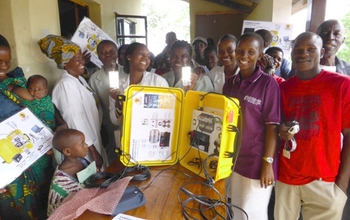News Release 16-129
NSF funds new projects to explore graduate education models
NSF Research Traineeship awards address key issues in the scientific community

Focus areas for awards include the intersection of food, water and energy.
October 19, 2016
This material is available primarily for archival purposes. Telephone numbers or other contact information may be out of date; please see current contact information at media contacts.
The National Science Foundation (NSF) is pleased to announce the most recent awardees for the NSF Research Traineeship (NRT) program, designed to encourage the development and implementation of bold, new, potentially transformative models for graduate education in the fields of science, technology, engineering and mathematics (STEM).
"Innovative and interdisciplinary approaches will be key to tackling tomorrow's scientific challenges, and today's STEM graduate students will need to develop the skills to meet those challenges," said Joan Ferrini-Mundy, NSF assistant director for Education and Human Resources. "The NSF Research Traineeship program is testing new models to train graduate students across STEM disciplines and to prepare them for contributions in diverse careers."
The NRT program addresses key issues in the scientific community, including educating and building the science and engineering workforce, broadening participation in STEM education to include traditionally underserved populations, and creating new resources at institutions that train STEM graduate students.
NRT is an NSF-wide effort to build new models for graduate education, while preparing the next generation of STEM graduate students to pursue a range of careers. NSF awarded a total of $47 million to 16 Traineeship projects in high-priority, interdisciplinary research areas, including eight projects in Data-Enabled Science and Engineering (DESE), three in Innovations at the Nexus of Food, Energy, and Water Systems research (INFEWS), and two in Understanding the Brain (UtB).
The principal investigators, institutions and titles for the new NRT awards are:
- STEM Training for Actionable Research and Global Impact (INFEWS), Alice Agogino, University of California, Berkeley
- PROACTIVE: Preparing Resilient and Operationally Adaptive Communities through an Interdisciplinary, Venture-based Education (DESE), Sez Atamturktur, Clemson University
- Intelligent Adaptive Systems: Training computational and data-analytic skills for academia and industry (DESE), Ramesh Balasubramaniam, University of California, Merced
- Neurophotonics (UtB), Thomas Bifano, Boston University
- University of South Dakota Neuroscience and Nanotechnology Network (UtB), Brian Burrell, University of South Dakota Main Campus
- Paths to Sustainable Food-Energy-Water Systems in Resource-Limited Communities (INFEWS), David Cwiertny, University of Iowa
- Interdisciplinary Research Traineeships in Data-Enabled Science and Engineering of Atomic Structure (DESE), Elizabeth Dickey, North Carolina State University and North Carolina Central University
- Network Biology: From Data to Information to Insights (DESE), Michelle Girvan, University of Maryland, College Park
- Interdisciplinary Graduate Training to Understand and Inform Decision Processes Using Advanced Spatial Data Analysis and Visualization (DESE), Robert Harrison, State University of New York at Stony Brook
- Grad-CAREER: Graduate Climate Adaptation research that Enhances Education and Responsiveness of science at the management-policy interface, Nancy Huntly, Utah State University
- NICE: NRT in Integrated Computational Entomology (DESE), Eamonn Keogh, University of California, Riverside
- C2R2: Coastal Climate Risk and Resilience, Robert Kopp III, Rutgers University-New Brunswick
- DIRECT: Data Intensive Research Enabling Clean Technologies (DESE), W. James Pfaendtner, University of Washington
- Team Science for Integrative Graduate Training in Data Science and Physical Science (DESE), Padhraic Smyth, University of California, Irvine
- RIP-TIDES: Research Intensive Pedagogical Training of InterDisciplinary Estuarine Scientists, Jonathon Stillman, San Francisco State University
- UM BRIDGES Bridging Divides across the Food, Energy, and Water Nexus (INFEWS), Laurie Yung, University of Montana
A total of $3.8 million was awarded to eight Innovations in Graduate Education projects that will pilot new approaches to graduate education. The principal investigators, institutions and titles for the new awards are:
- Promoting Creativity in Engineering and Technology Graduate Education through Integration of Arts, Design and Experiential Learning in the Curriculum, Sohel Anwar, Indiana University
- Advancing Graduate Education in the Chemical Sciences, Michael Ashby, University of Oklahoma, Norman Campus
- Research to Innovation to Society, Rich Carter, Oregon State University
- Mixed Reality Integrated Teaching Training for STEM Graduate Teaching Assistants, Fengfeng Ke, Florida State University
- Crossroads: Integrating Interdisciplinary Research and Teaching in Graduate Education, Bruce Kendall, University of California, Santa Barbara
- Information Infrastructure for Society: Integrating Data Science and Social Science in Graduate Education and Workforce Development, Frauke Kreuter, University of Maryland, College Park
- Deploying Holistic Admissions and Critical Support Structures to Increase Diversity and Retention of US Citizens in Physics Graduate Programs, Casey Miller, Rochester Institute of Technology and the American Physical Society
- Reducing Attrition in Underrepresented Minority and First-Generation Graduate Students in Interdisciplinary Computational Sciences, Marjorie Zatz, University of California, Merced
NSF has released the next NRT solicitation (NSF 16-503). Priority research areas in the solicitation are UtB (Understanding the Brain) and INFEWS (Innovations at the Nexus of Food, Energy, and Water Systems). More information is available at the NRT program website.
-NSF-
-
Researcher Ramesh Balasubramaniam (center) works to train graduate students in brain imaging.
Credit and Larger Version -
Clemson University's Sez Atamturktur (center) has assembled a multi-disciplinary research team.
Credit and Larger Version
Media Contacts
Rob Margetta, NSF, (703) 292-2663, email: rmargett@nsf.gov
The U.S. National Science Foundation propels the nation forward by advancing fundamental research in all fields of science and engineering. NSF supports research and people by providing facilities, instruments and funding to support their ingenuity and sustain the U.S. as a global leader in research and innovation. With a fiscal year 2023 budget of $9.5 billion, NSF funds reach all 50 states through grants to nearly 2,000 colleges, universities and institutions. Each year, NSF receives more than 40,000 competitive proposals and makes about 11,000 new awards. Those awards include support for cooperative research with industry, Arctic and Antarctic research and operations, and U.S. participation in international scientific efforts.
Connect with us online
NSF website: nsf.gov
NSF News: nsf.gov/news
For News Media: nsf.gov/news/newsroom
Statistics: nsf.gov/statistics/
Awards database: nsf.gov/awardsearch/
Follow us on social
Twitter: twitter.com/NSF
Facebook: facebook.com/US.NSF
Instagram: instagram.com/nsfgov




